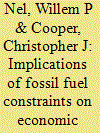| Srl | Item |
| 1 |
ID:
110439


|
|
|
|
|
| Publication |
2011.
|
| Summary/Abstract |
Zecca and Chiari (2010) have sought to challenge the findings of Nel and Cooper (2009), who argued that the impending peak and decline of fossil fuel production will most likely lead to a lower emissions trajectory than the majority of scenarios offered by the IPCC. Zecca and Chiari used their own model to produce a higher projection of atmospheric CO2 concentration, drawing on the conclusions of Archer (2005) to do so.
In this short comment, we show that the model of Zecca and Chiari is an erroneous interpretation of Archer (2005). We present a model based on an improved interpretation of Archer's paper and demonstrate that the model still significantly overpredicts atmospheric CO2 with respect to historical observations of CO2 concentrations.
Furthermore, whichever carbon cycle model one chooses to use (i.e. to convert a carbon emissions scenario into an atmospheric CO2 concentration), the primary concerns raised by Nel and Cooper (2009) - regarding an inability to achieve the IPCC's high emissions scenarios due to fossil fuel constraints - remain valid. These concerns are supported by a growing body of literature pointing to a peak in world oil and coal production within the coming few decades.
|
|
|
|
|
|
|
|
|
|
|
|
|
|
|
|
| 2 |
ID:
116978


|
|
|
|
|
| Publication |
2012.
|
| Summary/Abstract |
The simulated effects of anthropogenic global warming have become important in many fields and most models agree that significant impacts are becoming unavoidable in the face of slow action. Improvements to model accuracy rely primarily on the refinement of parameter sensitivities and on plausible future carbon emissions trajectories. Carbon emissions are the leading cause of global warming, yet current considerations of future emissions do not consider structural limits to fossil fuel supply, invoking a wide range of uncertainty. Moreover, outdated assumptions regarding the future abundance of fossil energy could contribute to misleading projections of both economic growth and climate change vulnerability. Here we present an easily replicable mathematical model that considers fundamental supply-side constraints and demonstrate its use in a stochastic analysis to produce a theoretical upper limit to future emissions. The results show a significant reduction in prior uncertainty around projected long term emissions, and even assuming high estimates of all fossil fuel resources and high growth of unconventional production, cumulative emissions tend to align to the current medium emissions scenarios in the second half of this century. This significant finding provides much-needed guidance on developing relevant emissions scenarios for long term climate change impact studies.
|
|
|
|
|
|
|
|
|
|
|
|
|
|
|
|
| 3 |
ID:
088041


|
|
|
|
|
| Publication |
2009.
|
| Summary/Abstract |
Best estimates of future energy availability are derived as an Energy Reference Case (ERC). An explicit economic growth model is used to interpret the impact of the ERC on economic growth. The model predicts a divergence from 20th century equilibrium conditions in economic growth and socio-economic welfare is only stabilised under optimistic assumptions that demands a paradigm shift in contemporary economic thought and focused attention from policy makers.
Fossil fuel depletion also constrains the maximum extent of Global Warming. Carbon emissions from the ERC comply nominally with the B1 scenario, which is the lowest emissions case considered by the IPCC. The IPCC predicts a temperature response within acceptance limits of the Global Warming debate for the B1 scenario. The carbon feedback cycle, used in the IPCC models, is shown as invalid for low-emissions scenarios and an alternative carbon cycle reduces the temperature response for the ERC considerably compared to the IPCC predictions.
Our analysis proposes that the extent of Global Warming may be acceptable and preferable compared to the socio-economic consequences of not exploiting fossil fuel reserves to their full technical potential.
|
|
|
|
|
|
|
|
|
|
|
|
|
|
|
|